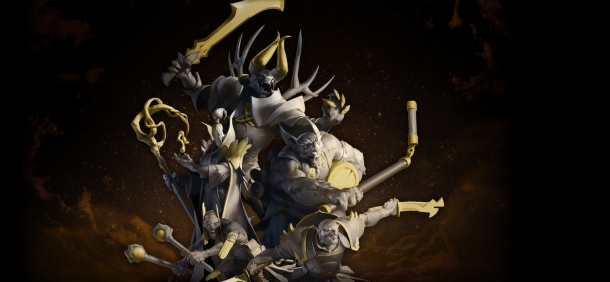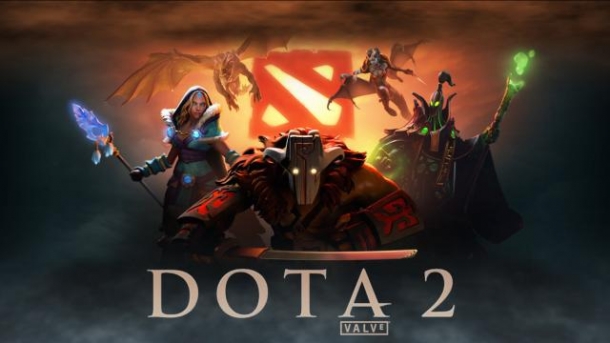
Introduction
"Behold before you, the illustrious, the imperious, ingenious arch-mage… CARL."
Many heroes in Dota 2 are considered versatile, but perhaps none moreso than Carl (yes, that's his name) the Invoker. With access to 10 unique spells and 14 different abilities, he can be built and played with infinite possibilities in mind.
Potentially a strong ganker, or a pusher, or a burst damage nuker, or a semi-carry, or an initiator, or a teamfight controller; the roles he can fit into are almost as vast as his array of spells, but while he is potentially one of the most intimidating heroes in the hero pool when in the right hands, he is very hard to play and has a lot of early-game weakness, and thus is not recommended for newer players.
Invoker's complete character profile can be accessed here.
Pros & Cons
Pros
- Highly versatile
- Potentially a global presence
- Good pusher
- Great teamfight control and high damage output
- Scales superbly for a caster
- 10 active abilities
Cons
- Hard to play, harder still to master
- Micro-intensive
- Requires the player to have good decision-making and positioning abilities
- Low base damage
- Terrible movement speed
- Fairly weak laner and slow farmer
- Mana intensive
- Needs levels
Item Build
 While Invoker's skill build and usage can be inordinately complex, his item requirements are fairly standard regardless of the role you intend to play. Invoker's primary weaknesses which items can help mitigate are: slow move speed, poor base damage, mana intensive, no innate positioning ability.
While Invoker's skill build and usage can be inordinately complex, his item requirements are fairly standard regardless of the role you intend to play. Invoker's primary weaknesses which items can help mitigate are: slow move speed, poor base damage, mana intensive, no innate positioning ability.
For starting items you have two standard options. The first is a damage-centric Phase Boots rush build, which allows you to more easily last hit and build up some right click damage quickly. Your starting items are: Blades of Attack, Healing Salve, and a Branch. The second is a more well-rounded stats build, and the starting items for this are: Healing Salve or a set of Tangos, Gauntlets of Strength, Circlet, and three Branches.
Core early game items, regardless of build, are: Phase Boots, Bracer, Magic Wand. You'll notice that, regardless of the starting items you bought, nothing goes to waste and all of them build into your core items.
There is one exception to this core early game built, and that is when you decide to go for a Hand of Midas. Hand of Midas is an amazing item on Invoker not (just) because of the gold bonus it grants you but because it allows you to level much faster than you otherwise would. Levels are immensely important on Invoker in order for his spells to scale well and for you to be an effective force going into the mid game. Hand of Midas is thus strongly recommended, and can be bought after you have Boots of Speed (or even before if you have an amazing start). Be warned, though: rushing Midas makes you very squishy and not at all intimidating in the lane, and if you die with a decent chunk on unreliable gold to your name it will set your progress back a long way.
Once you have your core you'll need to decide on your mid-game items. Although there are some situational item pick-ups that you may wish to prioritise ahead of these items (which I'll detail below), your standard mid-game pick-ups should typically be: Force Staff and Drums of Endurance.
With Phase Boots, Magic Wand, Drums of Endurance, Force Staff, and potentially a Hand of Midas you have almost everything you need to be effective in the mid-game and to continue scaling well into the late game. Drums, Phase Boots, and Force Staff all give you much-needed speed boosts/mobility to counteract Invoker's terrible base move speed. Force Staff also gives you the positioning capability you need to make the most effective use of your skillset, and also doubles up as a utility item for your team and another escape mechanism besides Ghost Walk (which is unreliable at best if the enemy gets detection at any point). Meanwhile, between Drums and Magic Wand you'll have a nice chunk of stat gain and thus a larger health and mana pool.
All of the above deals with your typical mid-game core items and makes for universally good item progression on Invoker. I'll now individually list and analyse some optimal situational or luxury pick-ups for Invoker, which are always worth considering after you have your core and sometimes worth investing in even before you have them:
Aghanim's Scepter - Aghanim's is always a good item to get on Invoker. In most cases you'll want to prioritise this first after you have your core, unless there's an item your team desperately needs instead. Aghanim's allows you to cast your ultimate without using mana and reduces the cooldown of it, allowing you to invoke spells with (virtually) no restrictions. This can transform Invoker from essentially contributing a three spell wombo-combo to fights into a spellcaster capable of contributing his entire repertoire of skills during extended teamfights.
Black King Bar - Always a good option on any hero, in particular carries and semi-carries, especially when the opposing team has high magic damage dealers or a lot of lockdown. It's situational, but the situation almost always occurs!
Ghost Scepter - Black King Bar's opposite. If you find the enemy carry rips through you too quickly or focusses you down, consider a Ghost Scepter. It will buy you 4 seconds in which to create space between you, either by casting spells (such as Ice Wall or Ghost Walk), or using items (Force Staff, Eul's, Blink).
Scythe of Vyse - The ultimate late-game/luxury item for Invoker. You'll need never worry about the mana cost of spells again, acquire a decent stat boost, and have access to a 3.5 second lockdown.
Eul's Scepter of Divinity - Often regarded as a cheaper alternative to a Scythe. You gain massive mana regen, and great speed boost (always welcome on Invoker), and a 2.5 second disable. The weakness of said disable is that it merely takes a person out of the fight; they cannot be attacked during the duration of the Cyclone. This also means Eul's can sometimes backfire (if you Cyclone an enemy with a blink, for example, you give their blink time to cooldown. Or if you target an enemy, rather than isolating them you may be buying their team time to come to their aid, and so on).
Blink Dagger - The ultimate mobility tool. As far as Invoker goes, Blink is really only recommended for those who have a good mastery of the hero, since its primary purpose is to allow you to blink in on an enemy, perform a wombo-combo that kills them, and then back out. This is typically easier said than done and, unlike an item like Force Staff, blink is unreliable as an escape tool. In conclusion: a luxury item that should only be picked up by very good Invoker players or games where you're massively ahead.
Orchid Malevolence - If you're transitioning into a semi-carry then consider getting Orchid. It'll give you a decent chunk of mana regen and a lot of offensive stats. Orchid is a great pick-up for any intelligence hero that's fitting into a carry or semi-carry role.
Eye of Skadi - Great stats and a decent attack modifier. Best left until you're 6 slotted and want to swap out one of your core items like Drums of Endurance.
Shiva's Guard - Another situational luxury item that's good to consider. It provides your team with utility, makes you much tankier, and has a good passive to counter enemy right-click carries.
Refresher Orb - Another item to consider if the game is going extremely late and you're 6 slotting your Invoker. At this stage of the game you should have enough mana to sustain your spell output and also use the active on refresher to give yourself the ability to throw out your spells again.
Necronomicon - A final situational item to consider is a Necro book. If you're in a pushing team it's a no-brainer, but an Invoker opting for the Cold Snap/Forged Spirits combo can get a lot out of it as well.
Skill Build
There is no optimal or core skill build for Invoker. His skill set allows for numerous different builds and skill combinations. However, there are a handful of highly popular and effective builds, which I'll detail below.
It's key to keep in mind what your team composition lacks or is strong at. If you have a pushing line-up then consider the Quas/Exort build; if you only have a single core consider a damage-centric semi-carry Exort build; and if you already have a dual core you may want to provide more utility and control and thus opt for a Quas/Wex build.
Quas/Exort Build (4-1-4)
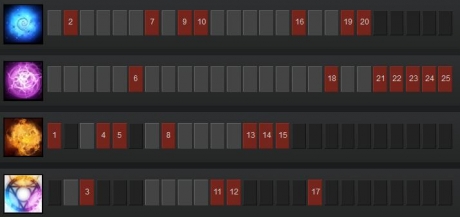 Your staple skills here will be Cold Snap (QQQ), Forge Spirit (EEQ), and Sun Strike (EEE).
Your staple skills here will be Cold Snap (QQQ), Forge Spirit (EEQ), and Sun Strike (EEE).
The Quas/Exort build is a great all-round build. It gives you superb pushing power (Forged Spirits), good ganking/single target pick-off potential (Cold Snap into right clicks. Sun Strike), and good overall damage.
Once you have 4 points in both Quas and Exort you will summon two Forged Spirits instead of one. The earliest at which you can get this is level 9 (4-0-4-1), although a value point in Wex is recommended early on for emergency Ghost Walks.
The downside is that you won't get a point in Wex until level 6 at the earliest, which means you won't be able to escape from any early ganks using Ghost Walk, but you may well be able to turn around any gank; cold snap into right clicks from yourself and forged spirits is extremely potent.
You also lack crowd control and have limited utility in teamfights with this build, at least heading into the mid-game. Your ability to burst down a single target still makes you a high damage dealer in teamfights, albeit only on a single target.
Despite the downsides it's one of the strongest builds for Invoker and can later easily transition into a high damage teamfight build using Deafening Blast and Chaos Meteor.
Quas/Wex Build (3-6-0)
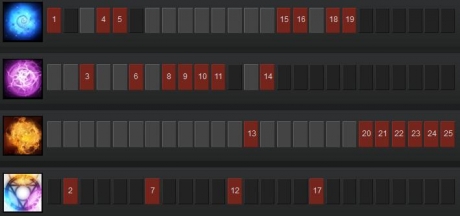 Your staple skills here will be Cold Snap (QQQ), Tornado (WWQ), and EMP (WWW). You can also use Ghost Walk (QQW) to escape early gank attempts.
Your staple skills here will be Cold Snap (QQQ), Tornado (WWQ), and EMP (WWW). You can also use Ghost Walk (QQW) to escape early gank attempts.
This is another very popular build. The Quas/Wex build is particularly strong if you already have two cores in your team because, although it gives you a lot of utility and crowd control in teamfights, you will not deal as much damage as you would using the other common builds. You will also struggle to secure last hits early in the lane without a point in Exort.
EMP/Tornado is your bread and butter combo, followed up with a Cold Snap on a target that your team can pick off. EMP/Torando is great for controlling the battlefield, delaying pushes, splitting up the enemy team, and harassing heroes that rely on their mana pools to be effective.
Although a very 'safe' build, the limited damage output it gives you means you will lack the ability to perform a play-making comeback should your team fall behind.
Exort Build (2-1-7)
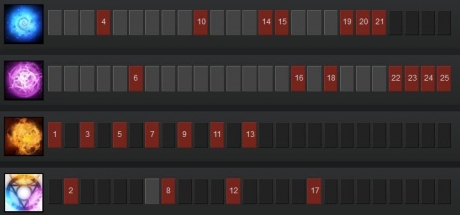 A popular public build is the all-in Exort damage build. Your staple skills are Sun Strike (EEE), Chaos Meteor (EEW), and Deafening Blast (QWE).
A popular public build is the all-in Exort damage build. Your staple skills are Sun Strike (EEE), Chaos Meteor (EEW), and Deafening Blast (QWE).
This build gives you notable right click damage, amazing AoE teamfight damage (Deafening Blast into Chaos Meteor with Cold Snap follow up), and good pick-off capabilities for other lanes (Sun Strike).
You'll make for a poor ganker and thus weak teamfighter early on, and your skills are both mana intensive and have high cooldowns, but if you do land your combo you'll deal huge amounts of damage. It's also great fun landing Sun Strikes on enemies heading back to the fountain!
Gameplay Tips

It should go without saying that you need to learn all of Invoker's combinations in order to excel with the hero. Often this can be too much to take in and you'll be so overwhelmed with spell options and spell management that you won't cast anything in the heat of the moment. If you're new to Invoker, pick a build from the ones listed above and focus on learning the combos for your core spells and how to use them most effectively. This makes Invoker much easier to play and you won't be so entirely distracted by all of the options available to you that you forget to actually play the game itself. It will limit your options, but it'll ease you into learning the hero and you won't be completely lost.
You almost always want to start with an orb in Exort as of the most recent patches. Invoker's base damage is so low that it makes last hitting creeps a struggle if you don't start with Exort.
Don't under-estimate the health regen Quas provides. You can forgo taking two sets of regen to the lane with you if you intend to invest a few points in Quas early on.
Often you will want to have the next skill you plan to Invoke already primed and ready to trigger with your ult, but don't be afraid to use the orbs for their base stats when you're not immediately about to engage the enemy (Quas for regen, Wex for moving between and to lanes, Exort for last hitting).
If your build includes points in Exort early on try to keep an eye on the other lanes or on the mini-map. If you see an opportunity use it to pick off low enemy heroes who are in retreat using Sun Strike.
| Tip: If your Sun Strike kills the enemy you will gain experience for the kill regardless of your position on the map. |
Alacrity is never your prime skill, but it can be useful mid-to-late game. Cast it either on yourself or a more potent physical damage dealer on your team before big teamfights and during pushes. Similarly, you can cast Forged Spirits even if you haven't invested heavily in Exort to help out during pushes.
Heroes that counter you are those with silences (e.g. Silencer, Night Stalker and Earth Spirit) because they prevent you getting off your skill combos, heroes with mutes (Doom Bringer & Legion Commander), and those who can potentially punish magic use strongly, like Pugna.
Last Updated - Patch 6.82.
